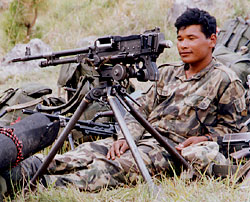 There is a sense of anticipation in the air after the flurry of unilateral Maoist ceasefires proposed and retracted over the Internet last week. Despite their denial, however, it now looks like the original unilateral ceasefire offer was a Maoist trial balloon. Now, a confluence of dates and anniversaries may be a sign that things will be coming to a head in the weeks ahead:
There is a sense of anticipation in the air after the flurry of unilateral Maoist ceasefires proposed and retracted over the Internet last week. Despite their denial, however, it now looks like the original unilateral ceasefire offer was a Maoist trial balloon. Now, a confluence of dates and anniversaries may be a sign that things will be coming to a head in the weeks ahead: . the state of emergency is up for a final six-month extension on 25 May
. the first anniversary of the royal tragedy on 1 June is the date when King Gyanendra comes out of official mourning
. the monsoon rains start in early-June and will make it difficult for the army to provide air support, and
. King Gyanendra is planning a visit to India.
There are also telltale signs that the Maoists are now keen on a new truce and maybe another big attack to make thier point. They are under pressure from human rights groups and other mediators to show confidence-building gestures to win back the government's trust. They are still able to make deadly raids on military bases, but are also feeling the effect of the army's improved psy-ops and undercover operations. The Maoist heartland is suffering from a severe food shortage, and the rebels need to restock on weapons and find new recruits. The rebels also need to step up extortion, food drives and to pay for its militia.
By attacking infrastructure the Maoists have unravelled some of their mass support in rural areas. To be sure, outside the district headquarters large parts of the hinterland are still under the sway of the Maoists. But even here, they have been forced to raid subsistence farmers for food. Most young men have all fled, and the Maoists' forced recruitment is now increasingly targetting young girls.
Maoist leader Prachanda's statement on 10 May was unexpectedly conciliatory, and political analysts said it reflected these pressures. For the first time, there were no derogatory remarks directly aimed at King Gyanendra, Crown Prince Paras, or Prime Minister Deuba. There was also a softening of his stance against parliamentary parties. "We put forward our demand for a constituent assembly to further the gains of the 1990 Peoples Movement, and we are willing to further relax this demand in consultation with political parties and the people," Prachanda writes, and continues: "Even if there is a minimum positive sign, we are ready at any point to declare a ceasefire and start negotiations."
In response, the government has repeated its demand that the Maoists must first surrender their weapons and renounce violence before talks can begin. The army is strongly opposed to any ceasefire, since it feels it has the Maoists on the run and suspects that the truce will only be used to regroup and rearm.
It is a stalemate, but as the debate for the renewal of the emergency heats up next week, political pressure will grow on the government to give in to negotiations.


